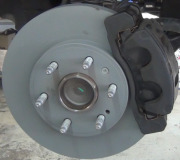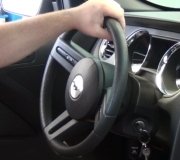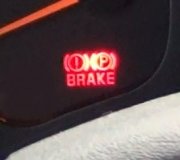There's two common causes of this. Lets hope it's not the expensive solution.
When this happens again, stop on a slight incline, shift to neutral, place a block about a foot downhill of one of the tires, then crawl underneath and open the bleeder screws on the front calipers. If that lets the brakes release, the repair involves the front rubber flex hoses. There's a metal bracket crimped around the middle of the hoses. Rust builds up inside those crimps and constricts the hoses. It isn't common for this to happen to both sides at the same time, but it is possible.
Use a large flat-blade screwdriver or a Channel Lock pliers to open those crimped brackets a little. Brake fluid can get through the restriction thanks to the pressure on the brake pedal, but it can't release on its own. That causes the brakes to drag a little and build up heat. That heat migrates into the brake fluid causing it to expand and apply the calipers even harder.
Before you do this, you can eliminate the other cause of this problem first if you want to. That involves brake fluid contaminated with a petroleum product. All rubber parts that contact the fluid will expand and become mushy. Specifically, the rubber lip seals inside the master cylinder will grow past the fluid return ports and block them. That also keeps the fluid trapped and the brakes will be dragging. This gets to be real expensive because every part that has rubber parts that contact the brake fluid must be removed. The steel lines must be flushed and dried, then all new rubber parts installed. That includes calipers, wheels cylinders, rubber flex hoses, combination valve under the master cylinder, if used, and the ABS hydraulic controller if your car has that too. This also includes the new master cylinder. If any part is not replaced, the contamination will leach out of it and recontaminate the new fluid and the new parts.
There's two quick ways to identify brake fluid contamination. First, the rubber bladder seal under the reservoir cap will be blown up and mushy. You won't be able to poke it back into the cap. The second clue is the brakes will release when you loosen the steel lines at the master cylinder because that is where the fluid is being trapped. Unlike with the hose brackets, with fluid contamination, the trapped fluid will release at the master cylinder and at the calipers. With the hose problem, the fluid will only release at the calipers, not at the master cylinder.
Sunday, June 13th, 2021 AT 5:02 PM



